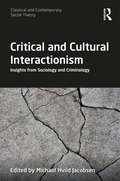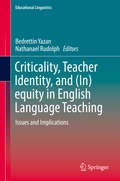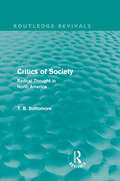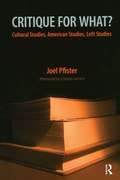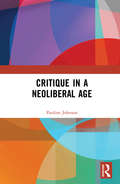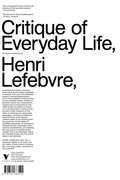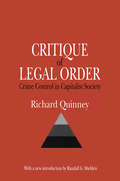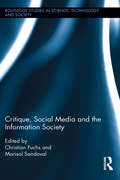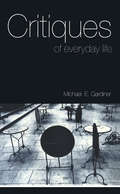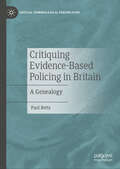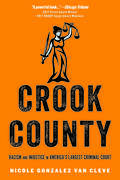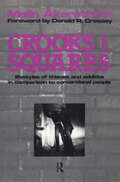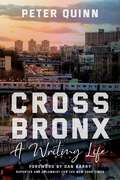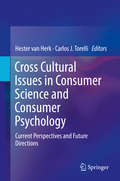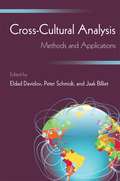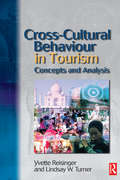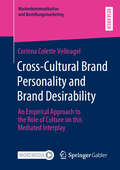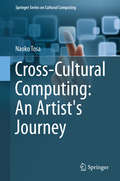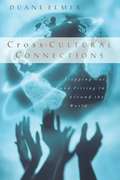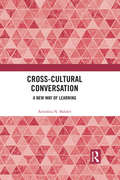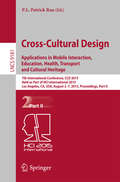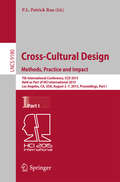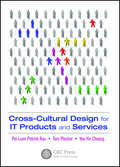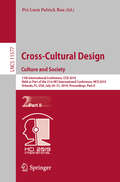- Table View
- List View
Critical and Cultural Interactionism: Insights from Sociology and Criminology (Classical and Contemporary Social Theory)
by Michael Hviid JacobsenOne of the longest standing traditions in sociology, interactionism is concerned with studying human interaction and showing how society to a large part is constituted by patterns of interaction. In spite of the work of figures such as Robert E. Park, Everett C. Hughes, Erving Goffman, Herbert Blumer, Norman K. Denzin and Gary Alan Fine, interactionism – perhaps owing to its association with the perspective of symbolic interactionism – remains something of an odd man out in mainstream sociology. This book seeks to rectify this apparent neglect by bringing together critical social theories and microsociological approaches to research, thus revealing the critical and cultural potentials in interactionism – the chapters arguing that far from being oriented towards the status quo, interactionism in fact contains a critical and cultural edge. Presenting the latest work from some of the leading figures in interactionist thought to show recent developments in the field and offer an overview of some of the most potent and prominent ideas within critical and cultural criminology, Critical and Cultural Interactionism will appeal to scholars of sociology with interests in interactionism, social theory research methods and criminology.
Criticality, Teacher Identity, and: Issues And Implications (Educational Linguistics #35)
by Nathanael Rudolph Bedrettin YazanThis edited volume, envisioned through a postmodern and poststructural lens, represents an effort to destabilize the normalized “assumption” in the discursive field of English language teaching (ELT) (Pennycook, 2007), critically-oriented and otherwise, that identity, experience, privilege-marginalization, (in)equity, and interaction, can and should be apprehended and attended to via categories embedded within binaries (e.g., NS/NNS; NEST/NNEST). The volume provides space for authors and readers alike to explore fluidly critical-practical approaches to identity, experience, (in)equity, and interaction envisioned through and beyond binaries, and to examine the implications such approaches hold for attending to the contextual complexity of identity and interaction, in and beyond the classroom. The volume additionally serves to prompt criticality in ELT towards reflexivity, conceptual clarity and congruence, and dialogue.
Critics of Society: Radical Thought in North America (Routledge Revivals)
by Tom B. BottomoreFirst published in 1967, this essay in the interpretation of radical social thought deals mainly with the radical theorists rather than the doctrines of social and political movements, but makes an exception in an important discussion of the new radicalism of the 1960s. The author's main concern is to lay bare the connections between intellectual dissent and theories of society, and in so doing to to explore the neglected subject of the heritage of American radical thinking. Readers of this book will not only emerge enlightened by Professor Bottomore's impressive knowledge of American radical thought, but with a greatly increased understanding of contemporary American history. He ends with the question of whether the new radicalism can find a firmer basis than the student movement or the negro revolt; cn produce an ideology both responsive to the doutbs and complexties of our time and capable of directing action to plausible ends.
Critique for What?: Cultural Studies, American Studies, Left Studies
by Joel PfisterStudents want to know: What does one do with critique? Fortunately, some of the most provocative self-critical intellectuals, from the postwar period to the postmodern present, have wrestled with this. Joel Pfister, in Critique for What?, criss-crosses the Atlantic to take stock of exciting British and US cultural studies, American studies, and Left studies that challenge the academic critique-for-critique's-sake and career's-sake business and ask: Critique for what and for whom? Historicizing for what and for whom? Politicizing for what and for whom? America for what and for whom? Here New Left revisionary socialists, members of the "unpartied Left," cultural studies theorists, American studies scholars, radical historians, progressive literary critics, and early proponents of transnational analysis interact in what amounts to a lively book-length strategy seminar. British political intellectuals, including Raymond Williams, E. P. Thompson, Stuart Hall, and Raphael Samuel, and Americans, including F. O. Matthiessen, Robert Lynd, C. Wright Mills, and Richard Ohmann, reconsider the critical project as social transformation studies, activism studies, organizing studies. Eager to prevent cultural studies from becoming cynicism studies, Critique for What? thinks creatively about the possibilities of using as well as developing critique in our new millennium.
Critique in a Neoliberal Age
by Pauline JohnsonCritique in a Neoliberal Age brings a critique of ideology to main debates within economic sociology, populism studies, the neoliberal university, therapy culture, contemporary intimacies and feminism. Over the last decades, neoliberalism has worked to lift social protections and political regulations from the market and to identify modernity with capitalism itself. It has also engaged in an ideological project to screen alternative measurements of progress. Liberal and social democracy have been effectively disabled as grounds for weighing the costs of neoliberal predations. This volume examines the strategies through which neoliberalism has reconstituted and de-politicized liberal precepts such as universal justice, private right and a social democratic project responsive to needs. As such it will appeal to scholars and students of sociology and social and critical theory, political and social philosophy, politics, cultural studies and feminist thought.
Critique of Everyday Life
by Henri LefebvreHenri Lefebvre's magnum opus: a monumental exploration of contemporary society.Henri Lefebvre's three-volume Critique of Everyday Life is perhaps the richest, most prescient work by one of the twentieth century's greatest philosophers. Written at the birth of post-war consumerism, the Critique was a philosophical inspiration for the 1968 student revolution in France and is considered to be the founding text of all that we know as cultural studies, as well as a major influence on the fields of contemporary philosophy, geography, sociology, architecture, political theory and urbanism. A work of enormous range and subtlety, Lefebvre takes as his starting-point and guide the "trivial" details of quotidian experience: an experience colonized by the commodity, shadowed by inauthenticity, yet one which remains the only source of resistance and change.This is an enduringly radical text, untimely today only in its intransigence and optimism.
Critique of the Legal Order: Crime Control in Capitalist Society (Law and Society)
by Randall G. Shelden Richard QuinneyOriginally published thirty years ago, Critique of the Legal Order remains highly relevant for the twenty-first century. Here Richard Quinney provides a critical look at the legal order in capitalist society. Using a traditional Marxist perspective, he argues that the legal order is not intended to reduce crime and suffering, but to maintain class differences and a social order that mainly benefits the ruling class. Quinney challenges modern criminologists to examine their own positions. As "ancillary agents of power," criminologists provide information that governing elites use to manipulate and control those who threaten the system. Quinney's original and thorough analysis of "crime control bureaucracies" and the class basis of such bureaucracies anticipates subsequent research and theorizing about the "crime control industry," a system that aims at social control of marginalized populations, rather than elimination of the social conditions that give rise to crime. He forcefully argues that technology applied to a "war against crime," together with academic scholarship, is used to help maintain social order to benefit a ruling class. Quinney also suggests alternatives. Anticipating the work of Noam Chomsky, he suggests we must first overcome a powerful media that provides a "general framework" that serves as the "boundary of expression." Chomsky calls this the manufacture of consent by providing necessary illusions. Quinney calls for a critical philosophy that enables us to transcend the current order and seek an egalitarian socialist order based upon true democratic principles. This core study for criminologists should interest those with a critical perspective on contemporary society.
Critique, Social Media and the Information Society (Routledge Studies in Science, Technology and Society)
by Christian Fuchs Marisol SandovalIn times of global capitalist crisis we are witnessing a return of critique in the form of a surging interest in critical theories (such as the critical political economy of Karl Marx) and social rebellions as a reaction to the commodification and instrumentalization of everything. On one hand, there are overdrawn claims that social media (Twitter, Facebook, YouTube, etc) have caused uproars in countries like Tunisia and Egypt. On the other hand, the question arises as to what actual role social media play in contemporary capitalism, crisis, rebellions, the strengthening of the commons, and the potential creation of participatory democracy. The commodification of everything has resulted also in a commodification of the communication commons, including Internet communication that is today largely commercial in character. This book deals with the questions of what kind of society and what kind of Internet are desirable, how capitalism, power structures and social media are connected, how political struggles are connected to social media, what current developments of the Internet and society tell us about potential futures, how an alternative Internet can look like, and how a participatory, commons-based Internet and a co-operative, participatory, sustainable information society can be achieved.
Critiques of Everyday Life: An Introduction
by Michael GardinerRecent years have witnessed a burgeoning interest in the study of everyday life within the social sciences and humanities. In Critiques of Everyday Life Michael Gardiner proposes that there exists a counter-tradition within everyday life theorising. This counter-tradition has sought not merely to describe lived experience, but to transform it by elevating our understanding of the everyday to the status of a critical knowledge.In his analysis Gardiner engages with the work of a number of significant theorists and approaches that have been marginalized by mainstream academe, including:*The French tradition of everyday life theorising, from the surrealists to Henri Lefebvre, and from the Situationist International to Michel de Certeau*Agnes Heller and the relationship between the everyday, rationality and ethics*Carnival, prosaics and intersubjectivity in the work of Mikhail Bakhtin*Dorothy E. Smith's feminist perspective on everyday life.Critiques of Everyday Life demonstrates the importance of an alternative, multidisciplinary everyday life paradigm and offers a myriad of new possibilities for critical social and cultural theorising and empirical research.
Critiquing Evidence-Based Policing in Britain: A Genealogy (Critical Criminological Perspectives)
by Paul BettsEvidence Based Policing (EBP) exerts significant influence on how actors think, act and speak about UK policing to the point that it is becoming institutionalised. Inspired by the insights of Michel Foucault into power-knowledge, governmentality and institutional reform over time, this book provides a comprehensive account of the emergence of EBP in Britain as well as original discourse analysis and analytical research into the texts produced by EBP. It presents a new history of EBP presented around EBP's story-lines, subject positions and the institutional changes it has created. This history shows EBP shares a genealogical heritage with modern discourses of managerialism and neoliberalism. EBP's roots are traced and it is re-presented as an extension of the problematic relationship in the production of criminological knowledge and the British state. This history fundamentally challenges the notion on which EBP rests: basing policing policy upon independent, robust knowledge. Instead this book argues EBP should be subject to greater illumination and challenge, suggesting EBP is a contestable device that is doing political work. It speaks to those interested in policing, critical criminology and political science.
Crook County: Racism and Injustice in America's Largest Criminal Court
by Nicole Gonzalez Van CleveAmericans are slowly waking up to the dire effects of racial profiling, police brutality, and mass incarceration, especially in disadvantaged neighborhoods and communities of color. The criminal courts are the crucial gateway between police action on the street and the processing of primarily black and Latino defendants into jails and prisons. And yet the courts, often portrayed as sacred, impartial institutions, have remained shrouded in secrecy, with the majority of Americans kept in the dark about how they function internally. Crook County bursts open the courthouse doors and enters the hallways, courtrooms, judges' chambers, and attorneys' offices to reveal a world of punishment determined by race, not offense. Nicole Gonzalez Van Cleve spent ten years working in and investigating the largest criminal courthouse in the country, Chicago-Cook County, and based on over 1,000 hours of observation, she takes readers inside our so-called halls of justice to witness the types of everyday racial abuses that fester within the courts, often in plain sight. We watch white courtroom professionals classify and deliberate on the fates of mostly black and Latino defendants while racial abuse and due process violations are encouraged and even seen as justified. Judges fall asleep on the bench. Prosecutors hang out like frat boys in the judges' chambers while the fates of defendants hang in the balance. Public defenders make choices about which defendants they will try to "save" and which they will sacrifice. Sheriff's officers cruelly mock and abuse defendants' family members. Crook County's powerful and at times devastating narratives reveal startling truths about a legal culture steeped in racial abuse. Defendants find themselves thrust into a pernicious legal world where courtroom actors live and breathe racism while simultaneously committing themselves to a colorblind ideal. Van Cleve urges all citizens to take a closer look at the way we do justice in America and to hold our arbiters of justice accountable to the highest standards of equality.
Crooks and Squares
by Malin Akerstrom'Crooks and Squares' is a study of crime as a way of life. By interviewing drug addicts and property criminals, Malin Akerstrom presents a study of the demands, attractions, and drawbacks of criminal lifestyles.
Cross Bronx: A Writing Life
by Peter QuinnIn his inimitable prose, master storyteller Peter Quinn chronicles his odyssey from the Irish Catholic precincts of the Bronx to the arena of big-league politics and corporate hardball.Cross Bronx is Peter Quinn’s one-of-a-kind account of his adventures as ad man, archivist, teacher, Wall Street messenger, court officer, political speechwriter, corporate scribe, and award-winning novelist. Like Pete Hamill, Quinn is a New Yorker through and through. His evolution from a childhood in a now-vanished Bronx, to his exploits in the halls of Albany and swish corporate offices, to then walking away from it all, is evocative and entertaining and enlightening from first page to last. Cross Bronx is bursting with witty, captivating stories.Quinn is best known for his novels (all recently reissued by Fordham University Press under its New York ReLit imprint), most notably his American Book Award–winning novel Banished Children of Eve. Colum McCann has summed up Quinn’s trilogy of historical detective novels as “generous and agile and profound.” Quinn has now seized the time and inspiration afforded by “the strange interlude of the pandemic” to give his up-close-and-personal accounts of working as a speechwriter in political backrooms and corporate boardrooms:“In a moment of upended expectations and fear-prone uncertainty, the tolling of John Donne’s bells becomes perhaps not as faint as it once seemed. Before judgment is pronounced and sentence carried out, I want my chance to speak from the dock. Let no man write my epitaph. In the end, this is the best I could do.” (from the Prologue)From 1979 to 1985 Quinn worked as chief speechwriter for New York Governors Hugh Carey and Mario Cuomo, helping craft Cuomo’s landmark speech at the 1984 Democratic Convention and his address on religion and politics at Notre Dame University. Quinn then joined Time Inc. as chief speechwriter and retired as corporate editorial director for Time Warner at the end of 2007. As eyewitness and participant, he survived elections, mega-mergers, and urban ruin. In Cross Bronx he provides his insider’s view of high-powered politics and high-stakes corporate intrigue.Incapable of writing a dull sentence, the award-winning author grabs our attention and keeps us enthralled from start to finish. Never have his skills as a storyteller been on better display than in this revealing, gripping memoir.
Cross Cultural Awareness and Social Justice in Counseling
by Jon Carlson Cyrus Marcellus EllisMany societal and cultural changes have taken place over the past several decades, almost all of which have had a significant effect on the mental health professions. Clinicians find themselves encountering clients from highly diverse backgrounds more and more often, increasing the need for a knowledge of cross-cultural competencies. Ellis and Carlson have brought together some of the leaders in the field of multicultural counseling to create a text for mental health professionals that not only addresses diversity but also emphasizes the counselor’s role as an advocate of social justice. The theoretical foundation for this book rests on research into diversity, spirituality, religion, and color-specific issues. Each chapter addresses the unique needs and relevant issues in working with a specific population, such as women, men, African Americans, Asian Americans, Spanish-speaking clients, North America’s indigenous people, members of the LGBT community, new citizens, and the poor, underserved, and underrepresented. Issues that enter into the counselor-patient relationship are discussed in detail for all of these groups, with the hope that this will lead to a greater understanding and sensitivity on the part of the counselor for their patients. This is an important and timely book for both counselors-in-training and those already established as professionals in today’s highly diverse and constantly-changing society.
Cross Cultural Issues in Consumer Science and Consumer Psychology: Current Perspectives and Future Directions
by Carlos J. Torelli Hester HerkThis integrative volume identifies and defines cross-cultural issues in consumer psychology and consumer science as the world becomes an increasingly global marketplace. An international panel of experts analyzes current trends in consumer behavior across diverse countries worldwide and across cultural groups within countries, depicting commonly-used cross-cultural frameworks and research methods. Beginning with conceptualizing and quantifying culture at the national level, the volume then moves to individual levels of analysis of consumer decision-making, examining consumer data as they affect business decisions in marketing products internationally. The resulting work synthesizes the consumer science, international business, and consumer psychology literatures for a deeper understanding of all three disciplines and pathways to future research as cultures interact and tastes evolve. Among the topics covered: Culture as a driver of individual and national consumer behavior. Consumer culture-based attitudes toward buying foreign versus domestic products. Country-of-origin effects: consumer perceptions of international products. The roles of cultural influences in product branding. Cultural aspects of consumer-brand relationships. Consumer behavior in the emerging marketplace of subsistence countries. This attention to both national detail and individual nuance makes Cross-Cultural Issues in Consumer Science and Consumer Psychology an instructive and highly useful reference for scholars and students in consumer psychology, cross-cultural psychology, marketing, international business, as well as professionals in these areas.
Cross-Cultural Analysis: Methods and Applications
by Eldad Davidov Peter Schmidt Jaak Billiet Bart MeulemanIntended to bridge the gap between the latest methodological developments and cross-cultural research, this interdisciplinary resource presents the latest strategies for analyzing cross-cultural data. Techniques are demonstrated through the use of applications that employ cross national data sets such as the latest European Social Survey. With an emphasis on the generalized latent variable approach, internationally–prominent researchers from a variety of fields explain how the methods work, how to apply them, and how they relate to other methods presented in the book. Syntax and graphical and verbal explanations of the techniques are included. A website features some of the data sets and syntax commands used in the book. Applications from the behavioral and social sciences that use real data-sets demonstrate: The use of samples from 17 countries to validate the resistance to change scale across these nations How to test the cross-national invariance properties of social trust The interplay between social structure, religiosity, values, and social attitudes A comparison of anti-immigrant attitudes and patterns of religious orientations across European countries. The book is divided into techniques for analyzing cross-cultural data within the generalized-latent-variable approach: multiple-group confirmatory factor analysis and multiple-group structural equation modeling; multi-level analysis; latent class analysis; and item-response theory. Since researchers from various disciplines often use different methodological approaches, a consistent framework for describing and applying each method is used so as to cross ‘methodological borders’ between disciplines. Some chapters describe the basic strategy and how it relates to other techniques presented in the book, others apply the techniques and address specific research questions, and a few combine the two. A table in the preface highlights for each chapter: a description of the contents, the statistical methods used, the goal(s) of the analysis, and the data set employed. This book is intended for researchers, practitioners, and advanced students interested in cross-cultural research. Because the applications span a variety of disciplines, the book will appeal to researchers and students in: psychology, political science, sociology, education, marketing and economics, geography, criminology, psychometrics, epidemiology, and public health, as well as those interested in methodology. It is also appropriate for an advanced methods course in cross-cultural analysis.
Cross-Cultural Behaviour in Tourism: Concepts And Analysis
by Lindsay Turner Yvette Reisinger, PhDCross-Cultural Behaviour in Tourism: Concepts and Analysis is important reading for those in the following areas of industry: * Tourism: illustrates the importance of cultural background in the tourist experience and how it is a major determinant in repeat visitation * Marketing: provides an understanding of the cultural background of a destination that is vital when formulating successful marketing strategies * Management: provides valuable examples on how cultures influence tourist behaviour and decision-making, helping managers to develop cross-cultural skills and deal with tourists from diverse cultural backgrounds Tourism is a service industry where people from different nationalities meet. In today's international marketplace it is imperative that those in the industry understand the influence of national cultures on their consumers in order to compete successfully for a market share. The book is accompanied by online resources which can be found at www.bh.com/companions/0750656689. These resources include an account of Hypothesis Testing, together with a detailed glossary and a comprehensive reference list of relevant materials.
Cross-Cultural Brand Personality and Brand Desirability: An Empirical Approach to the Role of Culture on this Mediated Interplay (Markenkommunikation und Beziehungsmarketing)
by Corinna Colette VellnagelThis research proposes and empirically tests the impact of brand personality dimensions on brand desirability in a cross-cultural context. Further, the concept of brand-self-congruity is tested on its mediating role between brand personality dimensions and brand desirability. The results reveal that certain brand personality dimensions can have a direct and/ or indirect impact on brand desirability. Yet, this effect mechanism has not only been found to be brand-dependent but also culture-dependent. In this context, the mediating role of brand-self-congruity was confirmed across all cultures and brands investigated. Important implications are derived for research and brand management. In different countries, different brand personality dimensions lead to brand desirability. Therefore, brand managers should know their markets, understand cultural differences and adjust their brand strategy accordingly in order to attain brand desirability.
Cross-Cultural Computing: An Artist's Journey (Springer Series on Cultural Computing)
by Naoko TosaThis exciting new book explores the relationship between cultural traditions and computers, looking at how people from very different cultures and backgrounds communicate and how the use of information technologies can support and enhance these dialogues. Historically we developed our understanding of other cultures through traditional means (museums, printed literature, etc. ) but the advent of information technologies has allowed us access to a plethora of material. Tosa asks the question "Can we understand other cultures using computers as media to supplement thinking and memorization?" Starting with a survey of art and technology, moving into the area of culture and technology, the book culminates with a vision of a new world based on an understanding of these relationships, allowing cultural creators and viewers the opportunity to reach a better and more profound understanding of the role information technology will play going forward.
Cross-Cultural Connections: Stepping Out and Fitting In Around the World
by Duane H. ElmerThis book intends to help the reader become aware of the realities in making a cultural transition--in business, in short- or long-term missions, as a bivocational person.
Cross-Cultural Conversation: A New Way of Learning
by Anindita N. BalslevThis book proposes a radical shift in the way the world thinks about itself by highlighting the significance of Cross-Cultural Conversations. Moving beyond conventional boundaries, it examines the language in which histories are written; analyzes how scientific technology is changing the idea of identity; and highlights the need for a larger identity across nationality, race, religion, gender, ethnicity and class. It asks for a concerted effort to engage each other in open conversational forums on a range of contemporary global issues, alter our attitudes toward self and the other, and unlearn prejudices that perpetuate the practice of divisive identities. The book also explores critical themes such as political actions, solidarity-in-diversity, clash of social identities, tensions between nationalism and globalism, the quest for global peace and authentic meeting of world religions. Further, it discusses the evolving connection between science and religion, focusing on key philosophical ideas that have permeated the Indian cultural soil. The book will be of great interest to scholars and researchers of philosophy, religious studies, science and technology studies, and cultural studies.
Cross-Cultural Design Applications in Mobile Interaction, Education, Health, Transport and Cultural Heritage: 7th International Conference, CCD 2015, Held as Part of HCI International 2015, Los Angeles, CA, USA, August 2-7, 2015, Proceedings, Part II (Lecture Notes in Computer Science #9181)
by P.L. Patrick RauThe two LNCS volume set 9180-9181 constitutes the refereed proceedings of the 7th International Conference on Cross-Cultural Design, CCD 2015, held as part of the 17th International Conference on Human-Computer Interaction, HCII 2015, in Los Angeles, CA, USA in August 2015, jointly with 15 other thematically similar conferences. The total of 1462 papers and 246 posters presented at the HCII 2015 conferences were carefully reviewed and selected from 4843 submissions. These papers of the two volume set address as follows: LNCS 9180, Cross-Cultural Design: Methods, Practice and Impact (Part I), addressing the following major topics: cross-cultural product design, cross-cultural design methods and case studies, design, innovation, social development and sustainability and LNCS 9181, Cross-Cultural Design: Applications in Mobile Interaction, Education, Health, Transport and Cultural Heritage (Part II), addressing the following major topics: cultural aspects of social media and mobile services, culture for transport and travel, culture for design and design for culture and culture for health, learning and games.
Cross-Cultural Design Methods, Practice and Impact: 7th International Conference, CCD 2015, Held as Part of HCI International 2015, Los Angeles, CA, USA, August 2-7, 2015, Proceedings, Part I (Lecture Notes in Computer Science #9180)
by P.L.Patrick RauThe two LNCS volume set 9180-9181 constitutes the refereed proceedings of the 7th International Conference on Cross-Cultural Design, CCD 2015, held as part of the 17th International Conference on Human-Computer Interaction, HCII 2015, in Los Angeles, CA, USA in August 2015, jointly with 15 other thematically similar conferences. The total of 1462 papers and 246 posters presented at the HCII 2015 conferences were carefully reviewed and selected from 4843 submissions. These papers of the two volume set address as follows: LNCS 9180, Cross-Cultural Design: Methods, Practice and Impact (Part I), addressing the following major topics: cross-cultural product design, cross-cultural design methods and case studies, design, innovation, social development and sustainability and LNCS 9181, Cross-Cultural Design: Applications in Mobile Interaction, Education, Health, Transport and Cultural Heritage (Part II), addressing the following major topics: cultural aspects of social media and mobile services, culture for transport and travel, culture for design and design for culture and culture for health, learning and games.
Cross-Cultural Design for IT Products and Services
by Pei-Luen Rau Tom Plocher Yee-Yin ChoongWith the increase of globalization of business and industry, IT products and services are produced and marketed across geographical cultural boundaries without any consideration of culture. There is a high probability that IT products and services developed in one country may not be effectively used in another country, which may hinder market penetration and sales and use of IT products and services. This book provides comprehensive coverage of the psychological foundations of cross-cultural design. The text presents methodology for assessing similarities, differences, likes, dislikes and difficulties with different information appliance products and information services.
Cross-Cultural Design. Culture and Society: 11th International Conference, CCD 2019, Held as Part of the 21st HCI International Conference, HCII 2019, Orlando, FL, USA, July 26–31, 2019, Proceedings, Part II (Lecture Notes in Computer Science #11577)
by Pei-Luen Patrick RauThis two-volume set LNCS 11576 and 11577 constitutes the thoroughly refereed proceedings of the 11th International Conference on Cross-Cultural Design, CCD 2019, which was held as part of the 21st HCI International Conference, HCII 2019, in Orlando, FL, USA, in July 2019. The total of 1275 papers and 209 posters included in the 35 HCII 2019 proceedings volumes were carefully reviewed and selected from 5029 submissions. CCD 2019 includes a total of 80 papers; they were organized in topical sections named: Part I, Methods, Tools and User Experience: Cross-cultural design methods and tools; culture-based design; cross-cultural user experience; cultural differences, usability and design; aesthetics and mindfulness.Part II, Culture and Society: Cultural products; experiences and creativity; design for social change and development; cross-cultural product and service design; intercultural learning.
